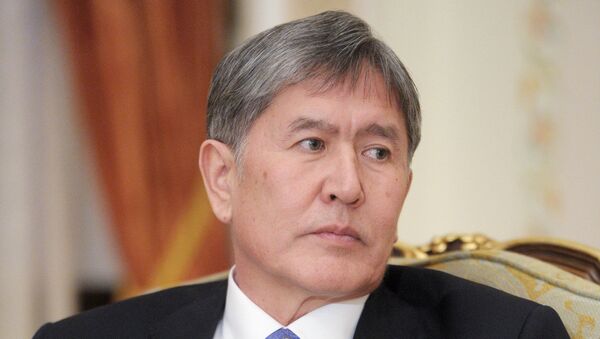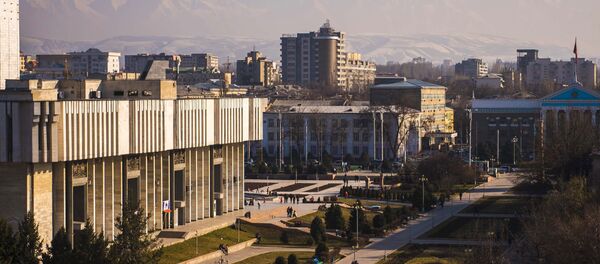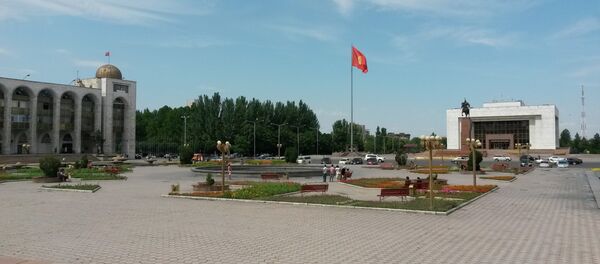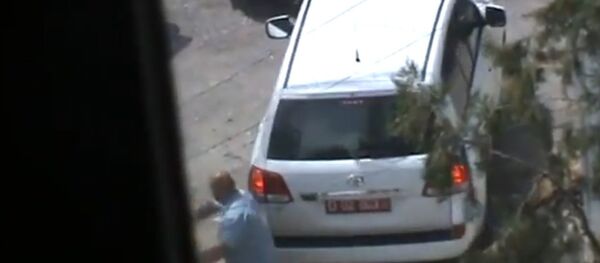Commenting on the government's decision during a marathon press conference before reporters at the Kyrgyz resort town of Cholpon-Ata on Monday, Atambayev stated that he did not appreciate what he considered to be an action "aimed at fomenting ethnic hatred" in his country.
"I would not like to see such a disaster repeated, and am unhappy with [the US's] attempts to create a situation of controlled chaos in our country," Atambayev noted.
The president noted that his government's main task lies in preserving "stability and the unity of our people," adding that he personally has "only one vector in foreign policy, and that is that everything must be done in the interests of our country. I completely support decision of the government and the Foreign Ministry on this issue."
The president likened the State Department's decision to grant the award to the activist to "an ember, which has landed on the grass. Perhaps it will go out, or it could ignite and cause a fire. In this way, an idea is being implanted in the minds of the Uzbek community that life is bad for them in Kyrgyzstan, that they are being treated unfairly, and separatist sentiment is being stirred up."
Atambayev emphasized that Kyrgyz authorities have repeatedly proposed that the US and the European Union send experts to become acquainted with Askarov's case. The rights activist had been sentenced to life imprisonment in 2011 for his role in organizing clashes in the south of the country, which included the killing of a Kyrgyz police officer.
The president also noted that despite the fact that Western countries have recognized the existence of an independent judiciary in Kyrgyzstan, he has nonetheless faced repeated requests to issue an executive pardon for Askarov.
In 2010, a series of deadly ethnic clashes between Kyrgyz and Uzbeks resulted in the death of over 400 people in Kyrgyzstan's southern regions of Osh and Jalal-Abad. Tens of thousands more were displaced by the unrest. Kyrgyz authorities have since said that the inter-ethnic clashes appear to have been instigated by people loyal to ex-President Kurmanbek Bakiyev, then a recently ousted pro-US leader who came to power following the 2005 "Tulip Revolution."
Controls to Be Placed on Foreign NGOs
Shevtsov noted the decision to toughen the rules is also likely to be connected to Kyrgyzstan's integration into the Eurasian Union. "There is a logic to the Eurasian integration process. If Kyrgyzstan has become a full member of the organization, it has a great deal yet to do in bringing itself in line with the general norms of the organization, including when it comes to NGOs. Belarus for example has a long history of taxing and monitoring them, while in Russia reforms are rapidly taking place in this area. It would be impossible for Kyrgyzstan to remain inside the Eurasian Union as a kind of 'offshore' exception to the rule."
In his Monday interview with reporters, Atambayev explained that he had no doubts that there are "foreign agents –people who receive money from foreign governments and carry out their orders, operating in the country." The president noted that these groups' have repeatedly attempted to "destabilize the situation" in Kyrgyzstan.
Shevtsov commented by noting that "US and US-funded NGOs had been concentrated in Kyrgyzstan for over 20 years, and relying on them, the US had worked throughout the region. Therefore, Kyrgyzstan occupies a very special position. I think that the US response to the president's statement will be negative, because if Kyrgyzstan reigns in the activities of US NGOs, Washington will lose a long-term foothold in the region, and there will be nothing to replace it. The US will definitely look for channels enabling them to act on this. Kyrgyzstan is too important a bridgehead for them."





